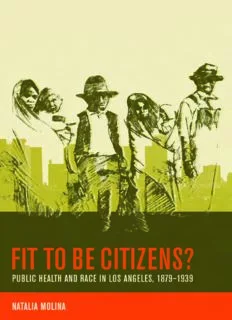
Fit to Be Citizens?: Public Health and Race in Los Angeles, 1879-1939 (American Crossroads) PDF
Preview Fit to Be Citizens?: Public Health and Race in Los Angeles, 1879-1939 (American Crossroads)
Fit to Be Citizens? AMERICAN CROSSROADS Edited by Earl Lewis, George Lipsitz, Peggy Pascoe, George Sánchez, and Dana Takagi 1. Border Matters: Remapping American Cultural Studies,by José David Saldívar 2. The White Scourge: Mexicans, Blacks, and Poor Whites in Texas Cotton Culture,by Neil Foley 3. Indians in the Making: Ethnic Relations and Indian Identities around Puget Sound,by Alexandra Harmon 4. Aztlán and Viet Nam: Chicano and Chicana Experiences of the War, edited by George Mariscal 5. Immigration and the Political Economy of Home: West Indian Brooklyn and American Indian Minneapolis,1945–1992, by Rachel Buff 6. Epic Encounters: Culture, Media, and U.S. Interests in the Middle East since 1945,by Melani McAlister 7. Contagious Divides: Epidemics and Race in San Francisco’s Chinatown, by Nayan Shah 8. Japanese American Celebration and Conflict: A History of Ethnic Identity and Festival, 1934–1990, by Lon Kurashige 9. American Sensations: Class, Empire, and the Production of Popular Cul- ture,by Shelley Streeby 10. Colored White: Transcending the Racial Past,by David R. Roediger 11. Reproducing Empire: Race, Sex, Science, and U.S. Imperialism in Puerto Rico,by Laura Briggs 12. meXicana Encounters: The Making of Social Identities on the Border- lands,by Rosa Linda Fregoso 13. Popular Culture in the Age of White Flight:Fear and Fantasy in Suburban Los Angeles,by Eric Avila 14. Ties That Bind: The Story of an Afro-Cherokee Family in Slavery and Freedom,by Tiya Miles 15. Cultural Moves: African Americans and the Politics of Representation, by Herman S. Gray 16. Emancipation Betrayed: The Hidden History of Black Organizing and White Violence in Florida from Reconstruction to the Bloody Election of 1920,by Paul Ortiz 17. Eugenic Nation: Faults and Frontiers of Better Breeding in Modern Amer- ica, by Alexandra Stern 18. Audiotopia: Music, Race, and America,by Josh Kun 19. Black, Brown, Yellow, and Left: Radical Activism in Los Angeles, by Laura Pulido 20. Fit to Be Citizens? Public Health and Race in Los Angeles, 1879–1939, by Natalia Molina Fit to Be Citizens? Public Health and Race in Los Angeles, 1879–1939 Natalia Molina UNIVERSITY OF CALIFORNIA PRESS Berkeley . Los Angeles . London University of California Press, one of the most distinguished university presses in the United States, enriches lives around the world by advancing scholarship in the humanities, social sciences, and natural sciences. Its activities are supported by the UC Press Foundation and by philanthropic contributions from individuals and institutions. For more information, visit www.ucpress.edu. University of California Press Berkeley and Los Angeles, California University of California Press, Ltd. London, England © 2006by The Regents of the University of California Library of Congress Cataloging-in-Publication Data Molina, Natalia. Fit to be citizens? : public health and race in Los Angeles, 1879–1939 / Natalia Molina. p. cm. — (American crossroads ; 20) Includes bibliographical references and index. isbn 0-520-24648-9(cloth : alk. paper). isbn 0-520-24649-7 (pbk. : alk. paper) 1. Immigrants—Health and hygiene—California— Los Angeles—History. 2. Asian Americans—Health and hygiene—California—Los Angeles—History. 3. Mexican Americans—Health and hygiene— California—Los Angeles—History. 4. Public health— California—Los Angeles—History. 5. Los Angeles (Calif.)—Race relations—History. I. Title. II. Series. ra448.4.m65 2006 362.1(cid:1)0979494—dc22 2005016385 Manufactured in the United States of America 15 14 13 12 11 10 09 08 07 06 10 9 8 7 6 5 4 3 2 1 This book is printed on New Leaf EcoBook 60, containing 60% post-consumer waste, processed chlorine free; 30% de-inked recycled fiber, elemental chlorine free; and 10% FSC-certified virgin fiber, totally chlorine free. EcoBook 60is acid-free and meets the minimum requirements of ansi/astm d5634-01 (Permanence of Paper). To my parents, Mary Molina and Héctor Molina Contents List of Illustrations ix Acknowledgments xi Introduction 1 1. Interlopers in the Land of Sunshine: Chinese Disease Carriers, Launderers, and Vegetable Peddlers 15 2. Caught between Discourses of Disease, Health, and Nation: Public Health Attitudes toward Japanese and Mexican Laborers in Progressive-Era Los Angeles 46 3. Institutionalizing Public Health in Ethnic Los Angeles in the 1920s 75 4. “We Can No Longer Ignore the Problem of the Mexican”: Depression-Era Public Health Policies in Los Angeles 116 5. The Fight for “Health, Morality, and Decent Living Standards”: Mexican Americans and the Struggle for Public Housing in 1930s Los Angeles 158 Epilogue: Genealogies of Racial Discourses and Practices 179 Notes 189 Bibliography 255 Index 273 Illustrations tables 1. Population of Los Angeles broken down by race, 1880–1940 7 2. Births by nationality in the unincorporated areas of Los Angeles County, 1915–26 92 3. Infant mortality rates by nationality in unincorporated sections of Los Angeles County, 1916–27 94 4. Percentage of births by nationality in Los Angeles County, 1930 144 figures 1. A Chinese vegetable peddler 34 2. Mexican housing 62 3. Mexican railroad workers 63 4. Mexican families 70 maps 1. Los Angeles’s Old Spanish Plaza 25 2. Location of laundry disputes 42 3. Neighborhoods in Los Angeles’s Eastside 81 4. Los Angeles’s Chinese neighborhoods 151 ix
Description: